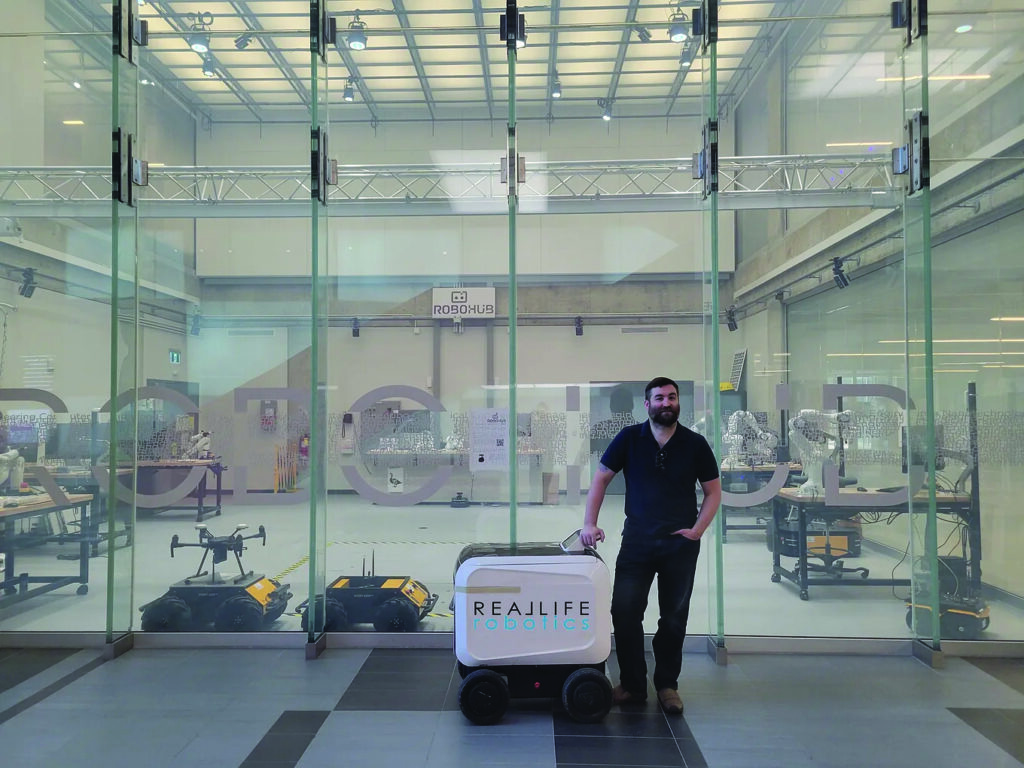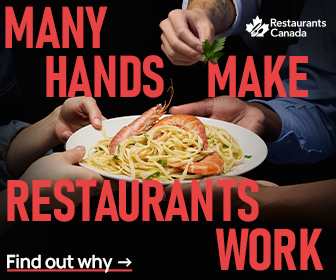Smart Tech is Fueling the Next Era of Hospitality
Dana McCauley, CEO of the Canadian Food Innovation Network (CFIN), gives the industry a view around the corner at what’s next.
Technology is no longer a nice-to-have in foodservice—it’s become a necessity. From rising costs and labour shortages to shifting consumer expectations, the industry is facing challenges that demand smarter, more efficient solutions. Automation, AI, and data-driven tools aren’t here to replace the human touch that makes hospitality unique; they’re here to enhance it, freeing up professionals to focus on what they have been trained to do: deliver unforgettable experiences.
The right technology helps operators streamline operations, reduce waste, and deliver better guest experiences—without sacrificing quality or creativity. Instead of fearing change, the most successful
businesses are embracing it, using innovation to fuel resilience, profitability, and long-term growth.
Serving all of Canada, the Canadian Food Innovation Network (CFIN) is fueling the next wave of food innovation by funding game-changing food technology, driving collaboration, and building the most dynamic food business community in Canada. And they’re doing just that—connecting
thousands of members from across the food value chain, from global brands to groundbreaking startups. CFIN provides tailored funding, resources and research to help innovators accelerate real-world
solutions to address the foodservice and hospitality sector’s unique challenges.
Just a few of the solutions CFIN has helped bring to market include Cheffer (cheffer.co), a smart ordering platform that helps hospitality operations maximize their purchasing cost savings, Remy (cibotica.com), a robotic makeline that automates repetitive tasks to enhance kitchen efficiency, and Harvest (harvestsystems.ca), an oven waste heat recovery system that reduces restaurant energy use.
MENU connected with Dana McCauley, CFIN’s CEO to help illuminate the trends, technologies and ideas that are moving foodservice forward.
MM: From your unique and focused vantage point, what are the most promising new technologies currently being developed for the foodservice and restaurant industry?
Dana McCauley: Two of the technologies for foodservice we’re most excited about include advanced robotics and artificial intelligence (AI). Robots are evolving rapidly and can now take on tasks that require a delicate touch, such as plating intricate dishes or handling more advanced cooking techniques. Some experts believe a “ChatGPT” moment for robotics is imminent—where these technologies become deeply embedded across industries and as part of our everyday lives. CFIN-funded companies like GreenCo Robotics (greencorobots.com) are at the forefront of this transformation.
AI is of course another game-changer. It’s already being used to power predictive analytics for inventory management, chatbots for customer engagement, and dynamic pricing models that help restaurants optimize revenue. One example is Jitto (getjitto.com) whose AI-enabled wholesale ordering platform helps foodservice operators save time, labour, and avoid lost sales.

MM: From an R&D perspective, what are the top transformative trends or areas of emerging focus in foodservice?
DM: In addition to robotics and AI, health and wellness is another rapidly evolving area with significant implications for the foodservice industry. Ingredient innovation is reshaping menu possibilities to align with shifting customer preferences. For instance, New School Foods’ (newschoolfoods.co) groundbreaking work to develop plant-based alternatives to whole-cut seafood products is unlocking new avenues for exciting culinary experimentation, combining the health and sustainability benefits of plant ingredients with the taste and texture of traditional animal products.
Functional foods are another dynamic area. Companies like Crush Dynamics (crushdynamics.com) are leveraging by-products from winemaking to create ingredients rich in antioxidants and other
bioactive compounds. These functional ingredients can enhance the nutritional profile of menu items, and facilitate the short, pronounceable ingredient lists that consumers are increasingly seeking—without compromising on taste.
MM: Sustainability and AI remain key areas of industry focus. What role does CFIN see artificial intelligence and sustainability playing in the future of restaurant operations and customer experience?
DM: AI-enabled sustainability solutions, like CarbonGraph’s (carbongraph.io) integrated platform that offers lifecycle assessments of products and services, hold significant promise for the hospitality sector. These tools can help restaurants quantify their impact and operate more sustainably while satisfying growing demands from customers and regulators for greater transparency.
Of course, barriers like high upfront costs and the need for specialized expertise can slow adoption of AI and sustainability solutions throughout the sector. That’s where organizations like CFIN come in—to connect operators with resources and knowledge that make it easier to take the leap.
MM: How have the headwinds buffeting the industry for the past four years—the pandemic, inflation, labour shortages—influenced research and development priorities in the foodservice sector?
DM: The challenges of the past few years have accelerated the digitization and automation of the sector to address labour shortages and inflationary pressures. We’re seeing new software platforms like App8 (app8solutions.com) flourish as restaurants strive to profitably manage their dine-in, pickup and delivery workflows amidst these pressures.
This period has also seen increasing R&D investments devoted to personalized nutrition and the concept of “food as medicine.” Companies like Fresh Prep (freshprep.ca) are responding to these trends by focusing on personalized meal kits tailored to individual health goals and dietary preferences. These advancements, alongside emerging technologies in wearable health monitoring and nutrigenomics, are reshaping how foodservice operators cater to health-conscious consumers by enabling customized, data-informed options.
Recent challenges are also influencing things like the development of functional foods and tools that enhance supply chain resilience. We’re seeing a lasting desire for solutions to issues like long-term health and operational adaptability that the pandemic brought into sharp focus.
MM: What are some of the most significant consumer trends affecting foodservice today, and how is CFIN helping businesses adapt?
DM: Consumer preferences are shifting rapidly, and some of the most significant trends include a growing demand for convenience, health-conscious choices, and transparency. Convenience is driving the rise of delivery, takeout, and quick-service dining. Demand for health-conscious plant-based, organic, and allergen-free options are also growing.
CFIN helps businesses adapt to these trends by providing funding, fostering collaboration, and connecting operators with cutting-edge solutions. YODL, our online community and platform, is designed to connect food businesses with technology providers and resources that make adapting to consumer demands simpler and faster.
MM: What are some of the most promising new kitchen technologies that are expected to revolutionize the foodservice industry in the next few years?
DM: The future of kitchens lies in smarter, more sustainable technologies designed to optimize efficiency and reduce waste. Large kitchen appliances are increasingly equipped with sensors to maintain precise temperatures, track energy usage, and ensure food safety. These smart appliances provide opportunities for kitchen operators to leverage digital tools and AI to monitor performance, predict maintenance needs in advance, and reduce downtime.
Energy-efficient cooking systems like induction ranges and waste-heat recycling will also become the industry norm. These advancements are setting the stage for kitchens that are not only more efficient but also environmentally and economically sustainable.
MM: Can you share any insights on the future of food delivery and takeout services?
DM: Food delivery and takeout services will continue to grow and evolve. Delivery platforms are expanding, and technologies like autonomous delivery robots are becoming a reality. Companies such as Real Life Robotics (realliferobotics.com) are already piloting robots capable of navigating complex, unpredictable environments to make food delivery faster and more efficient.
Ghost kitchens are another trend to watch, as part of a larger redefinition of what even qualifies as a restaurant kitchen. Along with the rise of on-demand commercial kitchen spaces like Syzl (syzl.io) launching a low-overhead, yet high-quality, takeout or delivery-oriented operation has become
easier than ever.
Finally, as takeout and delivery service continue to grow, so too does the need for more sustainable food packaging options. The development of lower-cost, easily compostable packaging options will accelerate as a shift away from single-use plastics continues to build momentum at the policy level.


MM: What new entrepreneurial opportunities do you see for restaurants looking to scale/diversify their offering?
DM: There are so many exciting opportunities for restaurants looking to grow. A post-pandemic trend has been the growth of virtual brands and ghost kitchens to let existing operators test new concepts or expand their reach without the high overhead of opening a new location.
Product line extensions are also popular, with restaurants branching into retail-ready items like sauces or frozen meals. These ventures allow businesses to leverage their brand recognition and connect with customers beyond the dining table. This can extend to subscription-based models, like meal kit deliveries or loyalty programs. Guelph-based Crafty Ramen’s (craftyramen.com) meal kits are a favourite amongst the CFIN team, and an excellent example of how restaurants can adapt and thrive in a competitive, constantly evolving industry.
About Dana McCauley, CFIN CEO

Dana McCauley is a value proposition driven innovator who leads the Canadian Food Innovation Network as it seeks to create sector change for Canada. Before joining CFIN in 2021, Dana successfully launched many food products and programs in collaboration with domestic and international food companies and entrepreneurs. Dana is known for having her finger on the pulse of food innovation after many years as a successful food writer and editor, a television food trends commentator, keynote speaker and a senior executive in the food manufacturing sector. Dana began the economic development phase of her career as the founding Executive Director for Food Starter, a Toronto based food business incubator and accelerator that was recognized with an Ontario Premier’s Award for Agri-Food Innovation Excellence. In 2017, Dana was recognized by WXN as one of Canada’s Most Powerful Women in the Trailblazers and Trendsetters category.

The Canadian Food Innovation Network (CFIN) is a national organization that’s stimulating transformative and transferrable innovation within the Canadian food sector. With over 6,000 members and counting, CFIN has built the fastest growing and most engaged food business community in the country and their members come from across the globe, representing all parts of the food value chain. CFIN’s free membership includes access to exclusive funding programs, five Regional Innovation Directors, and YODL.









